
The
EVERYTHING
Learning Latin Book
Dear Reader:
Over the past twenty-six years Ive studied and taught from manyLatin books. I dont like any of them very much. Here is the book I wishexisted when I was first learning Latin. The traditional approach lulls studentsinto a sense of false security. Simpler things come first, then graduallygrow more complex. Unfortunately, those complexities are morecommon, and when they suddenly appear, they dont fit the simplicityyou had been trained to expect.
This book breaks from tradition. Since what you learn first sticks withyou the best and becomes a template for the rest, the order of presentationhas been changed so you get the most often seen grammar and vocabularyfirst, then move toward the finer, less common stuff. In other words, thisbook is based on frequency. Still, there are some common points that mustbe postponed because they rely on other knowledge.
If youre like me, you get a sort of endorphin rush from exercising your brain with something new and challenging. Latin is challenging because its so different, not because its hard. Read on with an open mind and youll see.

The EVERYTHING Series
Editorial
| Publishing Director | Gary M. Krebs |
| Managing Editor | Kate McBride |
| Copy Chief | Laura MacLaughlin |
| Acquisitions Editor | Eric Hall |
| Development Editor | Karen Johnson Jacot |
| Production Editor | Khrysti Nazzaro |
Production
| Production Director | Susan Beale |
| Production Manager | Michelle Roy Kelly |
| Series Designers | Daria Perreault |
| Colleen Cunningham |
| Cover Design | Paul Beatrice |
| Frank Rivera |
| Layout and Graphics | Colleen Cunningham |
| Rachael Eiben |
| Michelle Roy Kelly |
| Daria Perreault |
| Erin Ring |
| Series Cover Artist | Barry Littmann |
Visit the entire EverythingSeries at everything.com
THE
EVERYTHING
LEARNING LATIN
BOOK
Read and write this classical language and apply it to modern English grammar, usage, and vocabulary
Richard E. Prior, Ph.D.

Copyright 2003, F+W Media, Inc. All rights reserved. This book, or parts thereof, may not be reproduced in any form without permission from the publisher; exceptions are made for brief excerpts used in published reviews.
An Everything Series Book. Everything and everything.com are registered trademarks of F+W Media, Inc.
Published by Adams Media, a division of F+W Media, Inc.
57 Littlefield Street, Avon, MA 02322 U.S.A.
www.adamsmedia.com
ISBN 10: 1-58062-881-8
ISBN 13: 978-1-58062-881-5
eISBN:978-1-44052-257-4
Printed in the United States of America.
10 9 8 7 6
Library of Congress Cataloging-in-Publication Data
Prior, Richard E.
The everything learning Latin book / Richard E. Prior.
p. cm.
ISBN 1-58062-881-8
1. Latin languageSelf-instruction. I. Title. II. Series: Everything series.
PA2094.5 .P75 2003
478.2'421dc21
2002153898
This publication is designed to provide accurate and authoritative information with regard to the subject matter covered. It is sold with the understanding that the publisher is not engaged in rendering legal, accounting, or other professional advice. If legal advice or other expert assistance is required, the services of a competent professional person should be sought.
From a Declaration of Principles jointly adopted by a Committee of the American Bar Association and a Committee of Publishers and Associations
Many of the designations used by manufacturers and sellers to distinguish their products are claimed as trademarks. Where those designations appear in this book and Adams Media was aware of a trademark claim, the designations have been printed with initial capital letters.
This book is available at quantity discounts for bulk purchases.
For information, call 1-800-289-0963.
For Scott and the Boys
Contents
A cknowledgments
My thanks to Hugh, my bud, for insights;
Franklin, my grand, for strength and inspiration;
Tarquin, Numa, and Sherman, my boys, for unconditional love;
and Scott, my always, for life.
Top Ten Reasons
to Learn Latin
Unlock the meanings behind the common Latin phrases you hear and use every day, such as ad hoc, mea culpa, and ad nauseam.
Develop an excellent basis from which to learn Spanish, Italian, French, and other languages.
Build your English vocabulary by learning Latin roots.
. Strengthen your reading and comprehension skills.
Improve your English grammar and usage.
Understand medical, mathematical, legal, and scientific terminology.
Read the ancient texts of Cicero, Vergil, and Horace.
Enhance your understanding of the Romans and their influence on the modern world.
Boost standardized tests scores.
Write with greater clarity and efficiency.
Introduction
 LATIN HAS ACQUIRED A REPUTATION for being a useless and lethal pursuit, a bitter medicine cruelly administered by strict schoolmarms old enough to be native speakers themselves. Perhaps youve heard this little schoolboy chant: Latin is a dead language, that is plain to see. First it killed the Romans, and now its killing me. In truth, Latin is more akin to the luscious grape cluster hanging just out of the foxs reach in Aesops fable. Rather than apply any effort to obtain the prize, he skulked off muttering how sour they probably were. If only he had tried hard enough to taste even a single grape!
LATIN HAS ACQUIRED A REPUTATION for being a useless and lethal pursuit, a bitter medicine cruelly administered by strict schoolmarms old enough to be native speakers themselves. Perhaps youve heard this little schoolboy chant: Latin is a dead language, that is plain to see. First it killed the Romans, and now its killing me. In truth, Latin is more akin to the luscious grape cluster hanging just out of the foxs reach in Aesops fable. Rather than apply any effort to obtain the prize, he skulked off muttering how sour they probably were. If only he had tried hard enough to taste even a single grape!
As off the mark as that little ditty is, it does bring up some important points. First, what does dead mean when applied to a language? Language is a living thing. It grows and changes day by day, imperceptibly, just as an infant grows to adulthood. There was never any calendar date marked when the folks in Rome stopped speaking Latin and started speaking Italian! The confusion may lie in the names we give languages. Ure Faeder the eart in heofenum is the beginning of the Lords Prayer in English as English was spoken fifteen hundred years ago. English isnt a dead language, but it isnt spoken like that anymore, so we call that kind of English Old English. Likewise, the language of Caesar could be called Old Italian. (Or Italian Modern Latin!) Studying Latin, then, is studying the snapshot of a whiz kid who is now grown-up.
The story of ancient Rome represents about 25 percent of all recorded history. If ancient Rome and her language are dead, tenacious ghosts remain. Nearly a billion people today speak Modern Latin (i.e. [id estthat is], French, Spanish, Portuguese, et al. [et aliaand the others]). If you look out your window and see bricks, concrete, or a paved road; if you turn on the news or pick up a newspaper and see any reference to law or government; youre looking at Romes ghost. In fact, if you speak English, youre perpetuating Romes linguistic legacy. Thanks to the forced importation of Norman French into England in 1066, over 60 percent of English vocabulary is derived from Latin, not to mention the fact that centuries ago the Latin language was considered so perfect that many fussy grammar rules (e.g. [
Next page
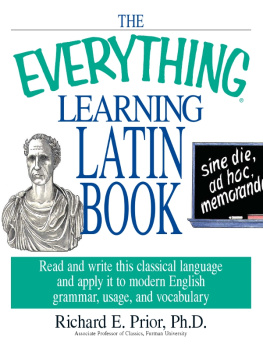
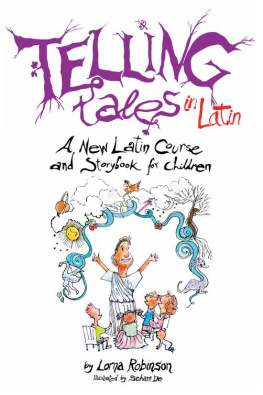

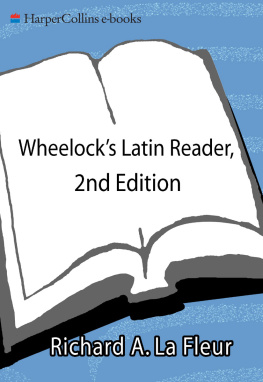

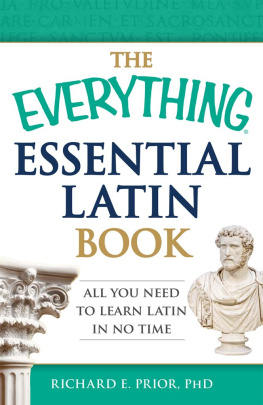
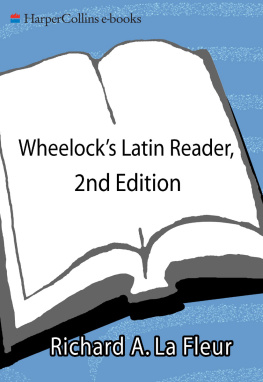



 LATIN HAS ACQUIRED A REPUTATION for being a useless and lethal pursuit, a bitter medicine cruelly administered by strict schoolmarms old enough to be native speakers themselves. Perhaps youve heard this little schoolboy chant: Latin is a dead language, that is plain to see. First it killed the Romans, and now its killing me. In truth, Latin is more akin to the luscious grape cluster hanging just out of the foxs reach in Aesops fable. Rather than apply any effort to obtain the prize, he skulked off muttering how sour they probably were. If only he had tried hard enough to taste even a single grape!
LATIN HAS ACQUIRED A REPUTATION for being a useless and lethal pursuit, a bitter medicine cruelly administered by strict schoolmarms old enough to be native speakers themselves. Perhaps youve heard this little schoolboy chant: Latin is a dead language, that is plain to see. First it killed the Romans, and now its killing me. In truth, Latin is more akin to the luscious grape cluster hanging just out of the foxs reach in Aesops fable. Rather than apply any effort to obtain the prize, he skulked off muttering how sour they probably were. If only he had tried hard enough to taste even a single grape!